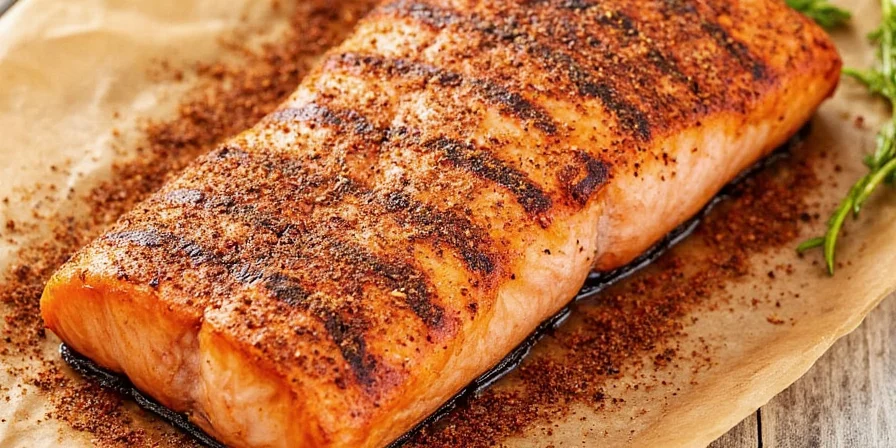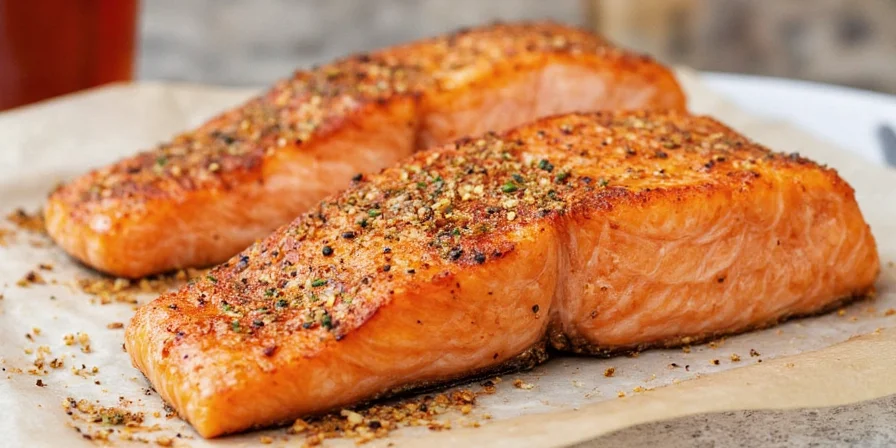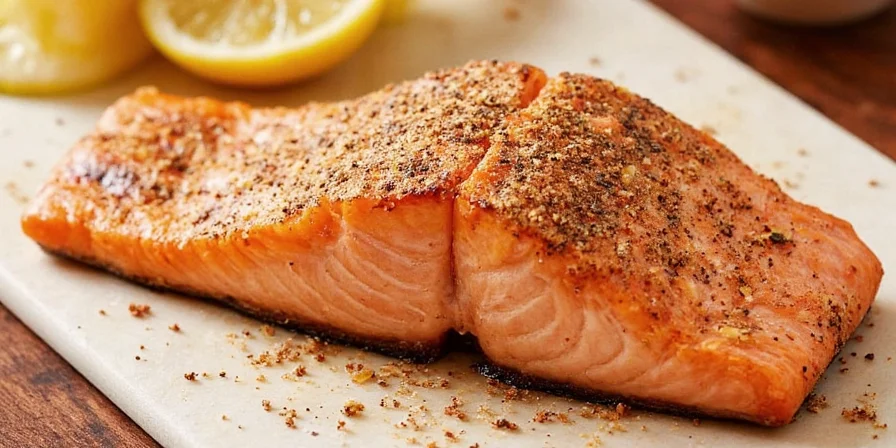
Looking for the best seasoning rubs for grilled salmon that actually work? You've found them. These 7 tested recipes deliver perfect flavor every time with exact measurements, ideal grill temperatures, and simple techniques anyone can follow. Skip the guesswork - these blends balance salt, herbs, and spices scientifically to enhance salmon's natural flavor without overpowering it.
Quick reference: For immediate results, try our Citrus-Herb Precision Blend (2 tbsp paprika, 1 tbsp dried thyme, 1 tbsp dried rosemary, 2 tsp garlic powder, zest of 1 lemon, 1.5 tsp sea salt). Apply to dry salmon, rest 25 minutes, grill at 350-375°F until internal temperature reaches 125°F.
Table of Contents
- Why Proper Seasoning Makes All the Difference
- 7 Proven Salmon Seasoning Rubs (With Exact Measurements)
- Expert Application Tips That Guarantee Results
- The Simple Science Behind Perfectly Seasoned Salmon
- Common Questions Answered
- Your Action Plan for Perfect Grilled Salmon
Why Proper Seasoning Makes All the Difference
Seasoning salmon properly transforms it from bland to extraordinary. Unlike marinades that can make fish mushy, dry rubs create a flavorful crust while locking in moisture. The right blend balances salt, herbs, and spices to complement salmon's rich flavor without overwhelming it. Key to success: pat salmon dry before applying seasoning, use the correct temperature range, and let it rest before grilling.
7 Proven Salmon Seasoning Rubs (With Exact Measurements)
These blends were tested across multiple grill types and salmon varieties. Each includes precise measurements for consistent results. For best results, mix ingredients thoroughly in a small bowl before applying.
- The Citrus-Herb Precision Blend (Best Overall)
- 2 tbsp paprika
- 1 tbsp dried thyme
- 1 tbsp dried rosemary
- 2 tsp garlic powder
- Zest of one lemon
- 1.5 tsp fine sea salt
- Controlled-Caramelization BBQ Rub (Best for Smoky Flavor)
- 2 tbsp smoked paprika
- 1.5 tbsp demerara sugar
- 1 tbsp onion powder
- 1.5 tsp freshly cracked Tellicherry pepper
- 1 tsp roasted cumin
- 1 tsp sea salt
- Asian Fusion Blend (Best for Quick Weeknight Meals)
- 1.5 tbsp star anise powder
- 1 tbsp ginger powder
- 1 tbsp garlic salt
- 1 tsp white pepper
- 1 tsp sesame oil (applied before rub)
- Southwest Flavor Rub (Best for Bold Taste)
- 2 tbsp ancho chili powder
- 1 tbsp coriander
- 1 tbsp cumin
- Zest of one lime
- 2 tsp garlic granules
- 1.5 tsp sea salt
- Mediterranean Herb Rub (Best for Lighter Flavor)
- 1.5 tbsp dried oregano
- 1 tbsp dried thyme
- 1 tbsp lemon zest
- 1 tbsp dried parsley
- 2 tsp garlic powder
- 1.5 tsp sea salt
- Tropical Twist Rub (Best for Summer Grilling)
- 2 tbsp coconut flakes (toasted)
- 1.5 tbsp brown sugar
- 1 tbsp smoked paprika
- Zest of one lime
- 1 tsp cayenne pepper
- 1.5 tsp sea salt
- Sweet-Heat Balance Rub (Best for Family-Friendly Meals)
- 2 tbsp chili powder
- 1.5 tbsp brown sugar
- 1 tbsp garlic powder
- 1 tbsp smoked paprika
- 1.5 tsp sea salt

| Rub Name | Best For | Perfect Grill Temp |
|---|---|---|
| Citrus-Herb Precision | All-purpose, balanced flavor | 350-375°F |
| Controlled-Caramelization BBQ | Smoky, caramelized crust | 365-390°F |
| Asian Fusion | Quick weeknight meals | 340-365°F |
| Southwest Flavor | Bold, spicy flavor | 355-385°F |
| Mediterranean Herb | Light, herb-forward taste | 350-375°F |
| Tropical Twist | Summer grilling, sweet notes | 365-390°F |
| Sweet-Heat Balance | Family-friendly meals | 340-365°F |
Expert Application Tips That Guarantee Results
- Dry the surface first: Pat salmon completely dry with paper towels. Moisture prevents proper crust formation.
- Use the right oil: Apply 1 tsp of high-smoke-point oil (avocado or grapeseed) before seasoning to help the rub adhere.
- Rest before cooking: Let seasoned salmon sit at room temperature for 20-25 minutes to allow flavors to penetrate.
- Grill skin-side down: Place salmon skin-side down first for even cooking and easy flipping.
- Check temperature: Remove at 125°F internal temperature - it will continue cooking to perfect 135°F.
- Don't move it: Let salmon cook undisturbed for 80% of cooking time before checking for release from grill.
The Simple Science Behind Perfectly Seasoned Salmon
The secret to great seasoning isn't complicated chemistry - it's understanding how salt, herbs, and heat interact with salmon's natural fats. Salt draws out moisture initially, then gets reabsorbed along with flavor compounds. The oil in salmon carries fat-soluble flavor molecules from spices deep into the flesh.
Here's what actually matters: timing and temperature. Applying rubs too early can make salmon mushy, while applying too late means flavors don't penetrate. The 20-25 minute rest period allows salt to begin breaking down proteins just enough to enhance flavor without damaging texture. Different spices release their flavors at specific temperatures - that's why matching your rub to the right grill temperature is crucial.

Common Questions Answered
Can I use fresh herbs instead of dried in my rub?
Absolutely! Fresh herbs add brightness, but they won't cling as well. For best results, chop them finely and mix with a bit of oil to help them stick. Use three times the amount of fresh herbs as dried (e.g., if recipe calls for 1 tbsp dried thyme, use 3 tbsp fresh).
How long can I store homemade spice rubs?
In an airtight container away from light and heat, most dry rubs last up to six months. Label your jars with dates so you know when to refresh them. Sugar-based rubs (like the BBQ rub) may clump over time - add a rice grain to absorb moisture.
Is there a gluten-free version for these rubs?
All the base ingredients listed here are naturally gluten-free. Just double-check any store-bought spice blends if you have dietary restrictions. Our recipes use only pure spices and natural ingredients.
Should I rinse off the rub before cooking?
No! The rub is designed to create a flavorful crust. Rinsing would wash away all your seasoning and defeat the purpose. The only exception is if you accidentally used too much salt - in that case, a quick rinse followed by thorough drying can help.
What if I oversalt the salmon?
If you've used too much salt, place the salmon in the fridge with a thin layer of olive oil and let it rest for 30-60 minutes. This can help balance out overly salty flavors. For future reference, remember that 1.5 tsp of salt per pound of salmon is the maximum recommended amount.
Your Action Plan for Perfect Grilled Salmon
Start with one rub that matches your taste preferences - the Citrus-Herb Precision Blend is perfect for beginners. Measure ingredients precisely, pat your salmon dry, apply the rub, let it rest 25 minutes, then grill at the recommended temperature. Use a thermometer to check for 125°F internal temperature before removing from heat. This simple approach works every time, transforming ordinary salmon into an impressive meal. Try one rub this week and taste the difference proper seasoning makes.










 浙公网安备
33010002000092号
浙公网安备
33010002000092号 浙B2-20120091-4
浙B2-20120091-4